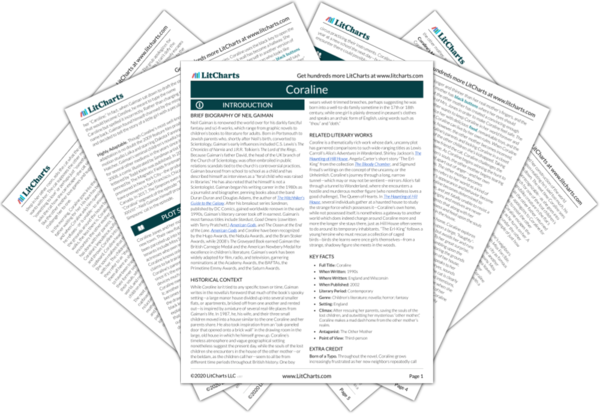Coraline Jones has a difficult relationship to food. Her father is an amateur chef who is always cooking fancy concoctions—which Coraline condescendingly refers to as “recipes”—and urging Coraline to try new dishes and new foods. Coraline ignores her father’s advice and subsists largely on microwave pizzas, frozen bread and jarred jam, and the occasional apple. Coraline’s hesitancy to try new foods symbolizes her petulance about having been moved to a new place and forced to do new things by her parents, who she feels don’t understand her. Food is, in Coraline’s view, a symbol of being misunderstood, unappreciated, and condescended to by the adults in her life. In the other mother’s realm, however, Coraline’s relationship to food mutates and morphs. The other mother and the other father prepare food for Coraline—but it’s food she’s excited to eat because it’s simple and delicious. Coraline’s other parents appear not to be foisting anything upon her—but in reality, they’re simply buttering her up and pampering her in an attempt to get her to stay in their twisted, dangerous realm forever. Once Coraline catches wise to the other mother’s evil, she begins avoiding the food the other mother serves as best she can—though she can’t resist a cheese omelet the other mother makes for her, she stops herself from drinking the hot chocolate the other mother brews, perhaps afraid of its power over her. Food is still a symbol of being misunderstood and condescended to—but in a very different way than it is in the “real” world. Ultimately, when Coraline rescues her parents and returns home, she finds herself eating even her father’s zaniest “recipes” with hunger and zeal. Coraline has learned that prepared food is an expression of love—when it’s prepared in the right way by the right people with the right intentions—and she wants to show her parents how much she appreciates them, and how much she has come to realize that they do, after all, appreciate her.
Food and Drink Quotes in Coraline
“Coraline?” the woman said. “Is that you?”
And then she turned around. Her eyes were big black buttons.
“Lunchtime, Coraline,” said the woman.
“Who are you?” asked Coraline.
“I’m your other mother,” said the woman. “Go and tell your other father that lunch is ready,” She opened the door of the oven. Suddenly Coraline realized how hungry she was. It smelled wonderful.

Unlock explanations and citation info for this and every other Coraline quote.
Plus so much more...
Get LitCharts A+“Why does she want me?” Coraline asked the cat. “Why does she want me to stay here with her?”
“She wants something to love, I think,” said the cat. “Something that isn’t her. She might want something to eat as well. It’s hard to tell with creatures like that.”
The cat dropped the rat between its two front paws. “There are those,” it said with a sigh, in tones as smooth as oiled silk, “who have suggested that the tendency of a cat to play with its prey is a merciful one—after all, it permits the occasional funny little running snack to escape, from time to time. How often does your dinner get to escape?”












